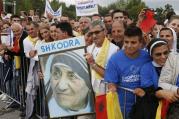Click here if you don’t see subscription options



Catholics and Politics
Msgr. Thomas J. Shelley, in his article Vatican II and American Politics (10/13), evokes a most interesting interlude in American history involving the candidacy of Al Smith. If many Americans wondered whether Catholics would impose an official religion if they became a majority, Catholics themselves had no need to speculate concerning their Protestant neighbors in that regard, since they already knew the answer. As Martin Marty, Robert Handy, Philip Hamburger and others have shown so well, Americans for more than a century had imposed a de facto establishment of nondenominational Protestantism that denied true religious liberty to Catholics and other outsiders.
What James Madison feared actually came to pass. He knew that a Bill of Rights represented only parchment barriers against majority oppression. However, the advent of Catholics in great numbers brought what he saw as the necessary pluralism of opposite and rival interests that would inevitably supply the checks and balances necessary to preserve true liberty. By their fidelity, opposition and persistence, Catholics contributed immensely to the creation of modern religious liberty, and in doing so they transformed this country. In 1960 the United States, by a hair’s breadth, acknowledged that transformationthat Catholics could be and were truly Americans.
Catholic scholars appreciate the development of doctrine and the fact that Catholicism is a historically conditioned religion. But they have not yet been able to apply the same thinking to American religious liberty, which they tend to see as springing full blown from the First Amendment. In the Second Vatican Council’s Declaration on Religious Liberty (1965), the church declared that it would not impose an official religion if Catholics became the majority. But with the election of John F. Kennedy, America had already affirmed that it would not and could not continue to maintain the official religion it had established when the majority of Americans were Protestant.
Historians can see how the United States influenced Catholicism, but they can perceive much less clearly how Catholicism transformed the United States. When American Catholic historians are able to grasp the interrelationindeed interdependenceof these two developments, they will be far better able to find a significant place for Catholicism in the history of the United States than is currently the case.
(Most Rev.) Thomas J. Curry







